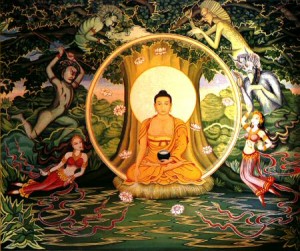The following is an excerpt from a teaching by Jetsunma Ahkon Lhamo called “Mixing the Mind with the Guru”
What I would like to talk about in the adult portion of our teaching is the particular situation, the predicament actually, that sentient beings find themselves in. Sentient beings are in a situation that is something of a struggle, in that for sentient beings often they have problems and not much understanding in the way of being able to solve their problems because they do not understand how their problems have arisen. They do not understand that they must apply an antidote. And often in their efforts to alleviate their own suffering, they perpetuate their problems. So I’d like to explain something of the Buddhist idea as to how that actually comes about. The Buddhist idea as to how our suffering comes about may differ somewhat from what we ordinarily consider the sources and reasons of our problems; and certainly I would think that the Buddhist idea of how to solve the problem will differ from what we have been taught in our society. So I hope that you will listen patiently and really give it a shot, give it a chance. Give it an opportunity to settle into your mind. What I will try to explain, then, is the format or the backbone of some Buddhist ideas.
According to the way we ordinarily view things, we feel or perceive ourselves to be a real and solid object stuck kind of in the center of an environment; and we feel ourselves to be interacting with our environment. From our perspective, it seems as though, from what our parents told us, one fine day we were born. We don’t actually remember that, but we’ve been told that that’s the case; and some of us have birth certificates and pictures to prove it. It seems as though we appeared within this environment. We were born, and from that point on, it seems as though circumstances have acted upon us to cause us to form in a certain way. That is a very popular idea. It is the idea of the day. Whenever one wishes to go into some kind of deeper study, or deeper awareness according to the potential and fad, actually, of our society, generally if we are not deeply religious people, even if we are moderately religious people, we will be guided into an understanding of the psychological makeup of an individual and how it interacts with its environment. And expecting the fact that the individual is what it seems to be exactly, no more, no less, we will begin to study what seems to be the cause and effect relationships between an individual and its environment.
For instance, we have the idea that if we grow up with kindness that probably we will be more healthy psychologically, that we will be more stable. And we have the idea that if we grow up with suffering, such as deprivation or even abuse, that we will be not kind, really, not caring and very insecure and very unhappy people. The idea is that if one grows up with abuse and neglect that one will certainly give abuse and neglect to others. We have the idea that if we grow up with poverty that we will grow up with characteristics that are natural to the impoverished person, whatever those characteristics are thought to be. But there are certain expectant results that we have from the way that we grow up. And actually people in our society spend, comparatively speaking, a fair amount of time looking at the way that they interact with their environment, looking at the characteristics that they have, the qualities that they have, and actually trying to trace them back to things that happened in their early childhood. These are things that we are taught to do. And this is the fashion, actually, of our time in this particular cultural environment.
Buddhist philosophy differs from that greatly, actually. The reason why Buddhist philosophy differs so much is that there are certain foundational expectancies that I’ve just listed that are so ordinary, so normal in our society that we wouldn’t even think to question them. For instance, we would not think to question that our experience begins at the time of our birth; and we would not think to question that our experience is completely controlled by the input of our environment and our parents. We would never think to question that. While we might accept the idea that we have come into this life with certain genetic predisposition, we don’t really understand that genetic predisposition. We think of it as kind of a chemical thing. And yet, even though we have this certain genetic predisposition, we think that for the most part our habitual tendencies, our ideas, our qualities have more to do with the way that we respond to the catalysts that are contained within our early life. That’s how we think.
The Buddha thinks differently about all of that. The philosophy that’s presented is actually quite different in that the Buddha teaches us that this is not the first incarnation or birth that we have ever taken; that as sentient beings we have been involved in a great many birth and death experiences; that we are actually locked into what is called cyclic existence or samsara, which is a cyclic death and rebirth experience. We are actually taught that this birth and death process has taken place many times. In fact, if you are a human and you can even hear the word Buddha, or can hear the teaching that will bring you closer to enlightenment in any way, shape, manner or form, then that should be considered proof that you have lived many times, because it takes many lifetimes of accumulated virtue and merit in order for you to be in this position. One does not happen to be in the position just because in the same way that apples happen to fall from trees. One has to have accumulated a great deal of virtue and merit in order to be in the position of even considering to practice the path of enlightenment. So you’ve had to have had a lot of experience as a sentient being. Oh, it doesn’t mean that you’re at the point where your future is assured. It doesn’t mean that you’re in such good shape that you really don’t have worry about it. It doesn’t mean that it’s downhill from here. It means that you still have a lot to do, because until we achieve enlightenment, actually, we really aren’t safe. We are still sentient beings and we are still revolving in cyclic existence; and we still have the same conditions and situations associated with being a sentient being. But the Buddha teaches us that we must have lived many lifetimes before.
So when we come into this life, we are actually an appearance, or a re-birth, of one who has with them a whole conglomeration of cause and effect relationships already instituted—already begun, already in action, already arising. Some in seed form and some arising in a very obvious and blatant way. If a sentient being has revolved in cyclic existence for some time, they have accumulated many habitual tendencies. They have begun many different causes and experienced many different effects. For some great long time, they have assumed that self-nature, their own self-nature as well as the nature of all phenomena is inherently real, and they, for a very long time, acted accordingly. According to Buddhist philosophy, that continuation, that stream of continuing assumption can be called a mindstream. A continued push, a movement of dynamic occurrence, all of which is based on the assumption of self-nature as being inherently real and the constant need to hold to self-nature and to define it.
Copyright © Jetsunma Ahkon Lhamo. All rights reserved

